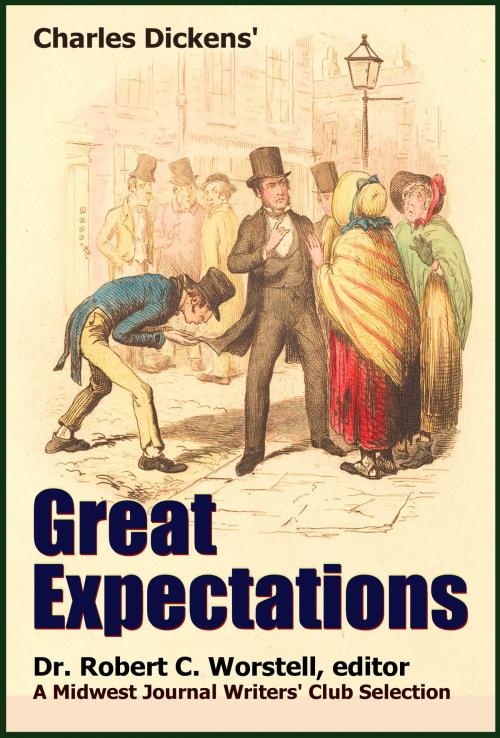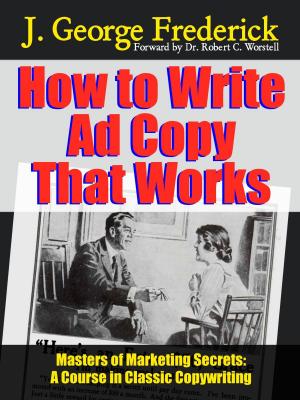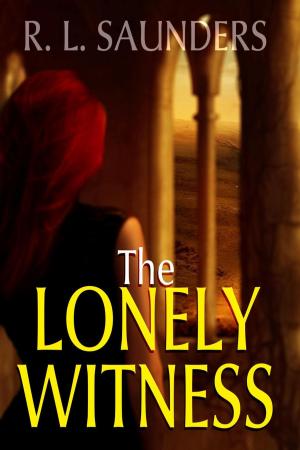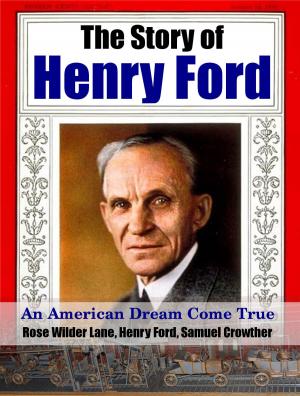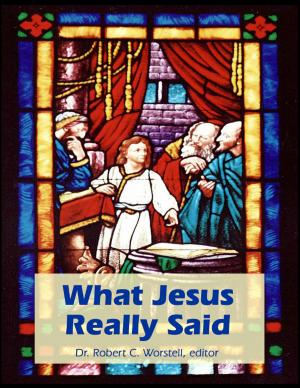Charles Dickens' Great Expectations
A Midwest Journal Writers Club Selection
Fiction & Literature, Classics, Literary, Romance, Historical| Author: | Midwest Journal Writers' Club, Dr. Robert C. Worstell, Charles Dickens | ISBN: | 9781304230782 |
| Publisher: | Midwest Journal Press | Publication: | July 14, 2013 |
| Imprint: | Language: | English |
| Author: | Midwest Journal Writers' Club, Dr. Robert C. Worstell, Charles Dickens |
| ISBN: | 9781304230782 |
| Publisher: | Midwest Journal Press |
| Publication: | July 14, 2013 |
| Imprint: | |
| Language: | English |
About this book:
Great Expectations is Charles Dickens's thirteenth novel. It is the second novel, after David Copperfield, to be fully narrated in the first person. Great Expectations is a bildungsroman, or a coming-of-age novel, and it is a classic work of Victorian literature. It depicts the growth and personal development of an orphan named Pip. The novel was first published in serial form in Dickens' weekly periodical All the Year Round, from 1 December 1860 to August 1861.
On Christmas Eve, around 1812, Pip, an orphan who is about six years old, encounters an escaped convict in the village churchyard while visiting the graves of his mother, father, and siblings. The convict scares Pip into stealing food and a file to grind away his shackles, from the home he shares with his abusive older sister and her kind, passive husband Joe Gargery, a blacksmith. The next day, soldiers recapture the convict while he is engaged in a fight with another convict; the two are returned to the prison ships from which they escaped.
Miss Havisham, a wealthy spinster who wears an old wedding dress and lives in the dilapidated Satis House, asks Pip's "Uncle Pumblechook" (who is actually Joe's uncle) to find a boy to play with her adopted daughter Estella. Pip begins to visit Miss Havisham and Estella, with whom he falls in love, with Miss Havisham's encouragement. Pip visits Miss Havisham multiple times, and during one of these visits, he brings Joe along. During their absence, Joe's wife is attacked by a mysterious individual and lives out the rest of her life as a mute invalid.
Later, when Pip is a young apprentice at Joe's blacksmith shop, a lawyer, Mr. Jaggers, approaches him and tells him he is to receive a large sum of money from an anonymous benefactor and must immediately leave for London, where he is to become a gentleman...
(source: Wikipedia)
About the author:
Charles John Huffam Dickens (7 February 1812 – 9 June 1870) was an English writer and social critic. He created some of the world's most memorable fictional characters and is generally regarded as the greatest novelist of the Victorian period. During his life, his works enjoyed unprecedented fame, and by the twentieth century his literary genius was broadly acknowledged by critics and scholars. His novels and short stories continue to be widely popular.
Dickens was regarded as the literary colossus of his age. His 1843 novella, A Christmas Carol, is one of the most influential works ever written, and it remains popular and continues to inspire adaptations in every artistic genre. His creative genius has been praised by fellow writers—from Leo Tolstoy to G. K. Chesterton and George Orwell—for its realism, comedy, prose style, unique characterisations, and social criticism.
(source: Wikipedia)
About the Midwest Journal Writers' Club:
This was created by popular request to enable any beginning or established author to improve their skills by studying quality editions of classic bestselling fiction. Join at http://midwestjournalpress.com
About this book:
Great Expectations is Charles Dickens's thirteenth novel. It is the second novel, after David Copperfield, to be fully narrated in the first person. Great Expectations is a bildungsroman, or a coming-of-age novel, and it is a classic work of Victorian literature. It depicts the growth and personal development of an orphan named Pip. The novel was first published in serial form in Dickens' weekly periodical All the Year Round, from 1 December 1860 to August 1861.
On Christmas Eve, around 1812, Pip, an orphan who is about six years old, encounters an escaped convict in the village churchyard while visiting the graves of his mother, father, and siblings. The convict scares Pip into stealing food and a file to grind away his shackles, from the home he shares with his abusive older sister and her kind, passive husband Joe Gargery, a blacksmith. The next day, soldiers recapture the convict while he is engaged in a fight with another convict; the two are returned to the prison ships from which they escaped.
Miss Havisham, a wealthy spinster who wears an old wedding dress and lives in the dilapidated Satis House, asks Pip's "Uncle Pumblechook" (who is actually Joe's uncle) to find a boy to play with her adopted daughter Estella. Pip begins to visit Miss Havisham and Estella, with whom he falls in love, with Miss Havisham's encouragement. Pip visits Miss Havisham multiple times, and during one of these visits, he brings Joe along. During their absence, Joe's wife is attacked by a mysterious individual and lives out the rest of her life as a mute invalid.
Later, when Pip is a young apprentice at Joe's blacksmith shop, a lawyer, Mr. Jaggers, approaches him and tells him he is to receive a large sum of money from an anonymous benefactor and must immediately leave for London, where he is to become a gentleman...
(source: Wikipedia)
About the author:
Charles John Huffam Dickens (7 February 1812 – 9 June 1870) was an English writer and social critic. He created some of the world's most memorable fictional characters and is generally regarded as the greatest novelist of the Victorian period. During his life, his works enjoyed unprecedented fame, and by the twentieth century his literary genius was broadly acknowledged by critics and scholars. His novels and short stories continue to be widely popular.
Dickens was regarded as the literary colossus of his age. His 1843 novella, A Christmas Carol, is one of the most influential works ever written, and it remains popular and continues to inspire adaptations in every artistic genre. His creative genius has been praised by fellow writers—from Leo Tolstoy to G. K. Chesterton and George Orwell—for its realism, comedy, prose style, unique characterisations, and social criticism.
(source: Wikipedia)
About the Midwest Journal Writers' Club:
This was created by popular request to enable any beginning or established author to improve their skills by studying quality editions of classic bestselling fiction. Join at http://midwestjournalpress.com
